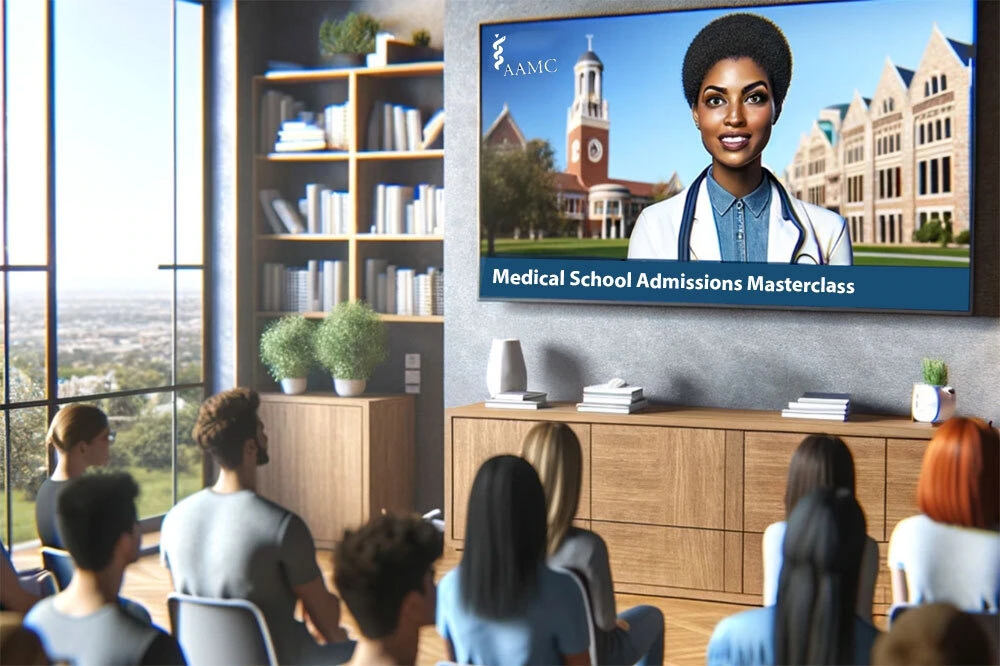
Understanding the AAMC’s Role in Medical Education
The AAMC is a pivotal organization in medical education, overseeing the MCAT exam, PREview exam, the AMCAS application process. Their resources and tools are designed to support pre-medical students, medical students, and residents, ensuring a smooth journey to becoming a physician.
Planning for the MCAT Exam as a Pre-Med
Strategic planning for the MCAT exam is crucial. The AAMC advises students to:
- Take the MCAT when you are ready, considering your familiarity with the content and comfort with the material.
- Develop effective study plans using resources like the AAMC’s six-step MCAT guide.
- Explore free and low-cost preparation materials such as the Khan Academy MCAT collection and the AAMC’s free MCAT study resources, which include a free practice test and sample test.
Navigating the AMCAS Application to Medical School
The AMCAS application is a comprehensive process requiring attention to detail. The AAMC advises aspiring physicians to:
- Complete the nine AMCAS sections, including coursework, work and activities, and the personal statement.
- Highlight experiences and competencies, making sure you meet the criteria outlined in the AAMC’s Anatomy of an Applicant resource.
- Utilize all the tools provided by the AAMC (see below) in order to best showcase your preparedness for medical school.
AAMC Financial Assistance for Med School Applicants
Applying to medical school can be expensive, but the AAMC offers several programs to ease the financial burden:
- Check out the Fee Assistance Program , which offers reduced MCAT fees, free prep materials, and application fee waivers.
- Explore the AAMC FIRST program (Financial Information, Resources, Services, and Tools), which provides valuable information for managing finances, borrowing wisely, and understanding loan repayment options.
Exclusive AAMC Pre-Med Resources
The AAMC provides a wealth of resources to guide students through their pre-med journey:
- Sign up for the Pre-Med Navigator Newsletter to get monthly updates on key topics, resources, and dates.
- Peruse the Aspiring Docs Resource, containing Fact sheets, inspiring stories, and diaries from medical students and residents.
- Read the Anatomy of an Applicant PDF, which details the 15 core pre-med competencies and offers tools to develop them.
- Consider applying to the Summer Health Professions Education Program (SHPEP), a free program to explore health careers and prepare for successful application to health profession schools
FAQs
Application Process
Q1: When should I submit my primary application?
A1: Submit as early as possible, ideally by June, to maximize your chances.
Q2: How do I write a strong personal statement?
A2: Highlight your motivations, experiences, and how you have grown from challenges; be concise and personal.
Q3: What should be included in the activities section of the application?
A3: Include a mix of non-medical, clinical, and research activities, focusing on achievements and what you learned.
Q4: How do I handle letters of recommendation for my application?
A4: Request letters early, provide ample information to your recommenders, and ensure they are submitted by the deadline.
Q5: What should I consider when choosing medical schools to apply to?
A5: Research each school’s requirements, focus areas, and support for your specific needs (e.g., non-traditional students).
Q6: How do I stand out in my medical school application?
A6: Have strong clinical and volunteer experiences, a compelling personal statement, and excellent letters of recommendation.
Q7: Can I apply to medical schools with a low GPA?
A7: Yes, but focus on other strengths like a high MCAT score, relevant experiences, and strong personal statements.
Q8: How do I prepare for secondary applications?
A8: Respond promptly and thoughtfully to each prompt, highlighting your fit with the school’s mission and values.
Q9: What is the timeline for submitting secondary applications?
A9: Aim to submit within 2 weeks of receiving them, and ideally by mid-August to be considered early.
Q10: What do I do if I need to retake the MCAT after submitting my primary application?
A10: Indicate the retake on your application and update schools with your new score once available.
Non-Traditional Applicants and Gap Years
Q1: Advice for non-traditional applicants?
A1: Highlight unique experiences and transferable skills, and focus on relevant clinical and volunteer experiences.
Q2: Should I take a gap year?
A2: A gap year can be beneficial if used to gain additional experiences, improve your application, or prepare for the MCAT.
Q3: How do I gain clinical experience as a non-traditional applicant?
A3: Volunteer at hospitals, clinics, or other healthcare settings, and consider shadowing physicians.
Q4: What should I do during a gap year?
A4: Focus on gaining clinical experience, volunteering, research, or any other activities that strengthen your application.
Q5: Can I apply to medical school with a career change background?
A5: Yes, highlight how your previous career has prepared you for a career in medicine and demonstrate your commitment.
Q6: How do I handle letters of recommendation if I’92m taking a gap year?
A6: Reach out to previous professors or supervisors early and maintain contact to ensure timely submission.
Q7: What is the best way to use gap years effectively?
A7: Gain meaningful experiences, improve your academic record if needed, and prepare thoroughly for the MCAT.
Q8: How do I address a lower GPA as a non-traditional student?
A8: Consider post-baccalaureate programs to improve your academic record and focus on excelling in recent coursework.
Q9: How do I navigate the application process if I’ve been out of school for several years?
A9: Seek advice from pre-med advisors, highlight relevant experiences, and ensure strong letters of recommendation.
Q10: How do I apply for medical school as a non-traditional student?
A10: Follow the same process but emphasize your unique journey and how it has prepared you for a career in medicine.
Read More: Should You Take a Gap Year Before Medical School?
Letters of Recommendation
Q1: How should I request letters of recommendation?
A1: Ask early, provide your recommenders with ample information about your goals and experiences, and follow up to ensure timely submission.
Q2: Who should write my letters of recommendation?
A2: Choose recommenders who know you well and can speak to your academic abilities, character, and suitability for medical school.
Q3: Can I submit my application before my letters of recommendation are ready?
A3: Yes, you can submit your application and add letters of recommendation as they become available, but ensure they are submitted before deadlines.
Q4: How many letters of recommendation are needed?
A4: Typically, 3-5 letters are required; check each school’s specific requirements for the exact number and types of letters.
Q5: Do letters of recommendation expire?
A5: Most letters remain valid for one application cycle; if applying in subsequent cycles, request updated letters.
Q6: How do I handle letters of recommendation if taking a gap year?
A6: Maintain relationships with potential recommenders and request letters early, even if you plan to apply later.
Q7: Are non-academic recommendation letters acceptable?
A7: Yes, non-academic letters can be valuable, especially if they provide insight into your character and experiences relevant to medicine.
Q8: How should I submit letters of recommendation?
A8: Use the application service’s designated system, like AMCAS, to ensure proper submission and tracking of your letters.
Q9: What should be included in a letter of recommendation?
A9: The letter should discuss your academic abilities, character, work ethic, and suitability for medical school, with specific examples.
Q10: How important are letters of recommendation in the application process?
A10: They are very important as they provide a personal perspective on your qualifications and readiness for medical school.
Academic Preparation and MCAT Preparation
Q1: How best to prepare for the MCAT if you have 3 months?
A1: Create a focused study plan, take practice exams, and review key concepts using study resources.
Q2: What GPA is needed to get into medical school?
A2: There is no specific GPA, but maintaining a competitive GPA and balancing it with strong extracurriculars and a good MCAT score is crucial.
Q3: What MCAT score is needed to get into med school?
A3: Aim for a score above the average; competitive scores vary, but generally a 510+ is considered strong.
Q4: Can I submit my application before receiving my MCAT score?
A4: Yes, you can submit your application if you are confident in your practice exam performance and update schools later.
Q5: How important is research experience during undergrad?
A5: Research experience is valued, but clinical experience and other relevant activities are also important.
Q6: How can I overcome a poor GPA/MCAT?
A6: Focus on excelling in other areas of your application, such as gaining relevant experiences and writing strong essays.
Q7: What study tips are most effective for the MCAT?
A7: Use reputable study resources, create a structured study plan, and take practice exams regularly.
Q8: What is the best timeline for MCAT prep?
A8: Start studying several months in advance, ideally 3-6 months, and create a detailed study schedule.
Q9: How do I prepare for the CASPer exam?
A9: Practice with sample questions and understand the test format; check each school’s requirements for taking it.
Q10: When is the best time to take the MCAT?
A10: Ideally, take the MCAT when you feel fully prepared, usually by the end of your junior year or early in the application cycle.
MCAT Timing
Q1: How should I prepare for the MCAT if I have 3 months?
A1: Create a study schedule, focus on high-yield content, take practice exams, and review your weak areas consistently.
Q2: What is the best way to study for the MCAT with limited time?
A2: Prioritize high-yield topics, use practice questions and exams, and focus on improving your weakest subjects.
Q3: When is the best time to take the MCAT if applying to medical school this cycle?
A3: Ideally, take the MCAT by June to ensure your scores are available early in the application process.
Q4: How can I study for the MCAT if I have been out of school for several years?
A4: Use comprehensive review books, online resources, and consider taking a prep course to refresh your knowledge.
Q5: Are two months of MCAT prep too short?
A5: It can be enough if you study intensively, focus on high-yield topics, and take multiple practice exams.
Q6: How should I plan my MCAT study schedule?
A6: Create a detailed study plan that covers all MCAT sections, includes regular practice exams, and allows for review of weak areas.
Q7: What are some effective MCAT study tips?
A7: Use practice questions, review high-yield content, take full-length practice exams, and analyze your mistakes thoroughly.
Q8: How important are MCAT scores in medical school admissions?
A8: MCAT scores are a critical component of your application and should be as high as possible to enhance your competitiveness.
Q9: What are some affordable MCAT prep resources?
A9: Utilize free online resources, such as Khan Academy, and affordable prep books from reputable publishers.
Q10: How can I balance MCAT prep with a part-time job?
A10: Create a flexible study schedule, use evenings and weekends for intensive study sessions, and prioritize high-yield materials.
Extracurricular Activities and Experiences
Q1: How should I pick my extracurriculars to strengthen Med school interests without coming across as simply “checking boxes”?
A1: Participate in activities you are passionate about that develop skills like leadership, communication, and empathy.
Q2: Other than the academic aspect needed, what are some ways I can exhibit my excitement/passion towards medicine?
A2: Engage in clinical and volunteer experiences that demonstrate your commitment to the field.
Q3: What experiences do the committee of admission think are important experiences? for example: clinical and volunteer experiences
A3: Committees value clinical experience, volunteer work, research, and leadership roles that show a commitment to medicine.
Q4: Do you need recommendation letters to submit your primary application?
A4: Yes, recommendation letters are required for your primary application.
Q5: How can pre-meds maximize their chances of getting accepted into med school?
A5: Gain clinical experience, participate in meaningful extracurriculars, maintain a strong GPA, and score well on the MCAT.
Q6: Is hospice volunteering clinical experience?
A6: Yes, hospice volunteering is considered clinical experience.
Q7: What extracurriculars should a student participate in high school?
A7: Focus on activities that develop relevant skills, such as volunteering at hospitals and participating in health-related clubs.
Q8: Can you provide examples of strong responses to questions like “Why do you want to be a doctor?”
A8: Responses should be personal, reflecting genuine motivations and specific experiences that influenced your decision.
Q9: Is it okay to have meaningful experiences that are primarily research-based?
A9: Yes, as long as they provide insights into your motivation for pursuing an MD.
Q10: How many clinical hours are needed for medical school?
A10: Aim for 100-150 hours of diverse and meaningful clinical experience.
Application Timeline and Deadlines
Q1: When should I start working on my application?
A1: Start several months before the application cycle opens to gather materials, write essays, and request letters of recommendation.
Q2: When should I submit my primary application?
A2: Submit as early as possible, ideally in June, to maximize your chances in the rolling admissions process.
Q3: What is the deadline for submitting secondary applications?
A3: Aim to submit secondary applications within two weeks of receiving them, and by mid-August to be considered early.
Q4: When is the latest I can take the MCAT to apply for this cycle?
A4: Ideally, take the MCAT by June; taking it later can delay your application and reduce your chances.
Q5: How do I plan my timeline if I intend to take a gap year?
A5: Use your gap year to gain meaningful experiences, improve your application, and prepare for the MCAT if needed.
Q6: What is the Early Decision Program?
A6: The Early Decision Program allows you to apply to one school early and receive a decision by October 1; if accepted, you must attend that school.
Q7: How do I handle application deadlines for different schools?
A7: Keep a detailed calendar of each school’s deadlines and ensure all materials are submitted well before each deadline.
Q8: When should I take the CASPer and PREview exams?
A8: Take them early in the application cycle, ideally by June, to ensure your scores are available for schools that require them.
Q9: How do I submit my transcripts to medical schools?
A9: Request official transcripts from all institutions attended and have them sent directly to the application service, like AMCAS or AACOMAS.
Q10: What are the key dates in the medical school application cycle?
A10: Key dates include the opening of the application cycle (typically in May), primary application submission (June), secondary application deadlines (varies by school), and interview season (fall through winter).
Personal Statement and Essays
Q1: How should I start my personal statement?
A1: Begin with a compelling story or experience that demonstrates your passion for medicine and highlights your unique qualities.
Q2: What are the key elements of a strong personal statement?
A2: A strong personal statement includes a clear motivation for pursuing medicine, specific experiences, and reflection on what you’ve learned.
Q3: How do I address weaknesses in my application in my personal statement?
A3: Acknowledge the weaknesses, explain the context, and highlight the steps you’ve taken to overcome them and improve.
Q4: Should I use anecdotes in my personal statement?
A4: Yes, using personal anecdotes can make your statement more engaging and illustrate your experiences effectively.
Q5: How can I make my personal statement stand out?
A5: Be authentic, focus on unique experiences, and clearly articulate your passion and readiness for medical school.
Q6: How do I handle writer’s block when writing my personal statement?
A6: Break the task into smaller parts, start with an outline, and write freely without worrying about perfection initially.
Q7: Can I include experiences from high school in my personal statement?
A7: Only include high school experiences if they are particularly relevant and have had a lasting impact on your decision to pursue medicine.
Q8: How long should my personal statement be?
A8: Follow the application service’s guidelines, typically around 5,300 characters, including spaces, for AMCAS.
Q9: What should I avoid in my personal statement?
A9: Avoid clich’e9s, repetition, and irrelevant details; focus on your unique journey and what makes you a strong candidate.
Q10: How do I conclude my personal statement effectively?
A10: Summarize your key points, reiterate your passion for medicine, and express your excitement about the journey ahead.
Clinical Experience
Q1: What are some valuable extracurricular activities for pre-med students?
A1: Clinical volunteering, research, shadowing physicians, and leadership roles in student organizations are highly valued.
Q2: How important are clinical hours in medical school applications?
A2: Clinical hours are crucial as they demonstrate your commitment to and understanding of the medical field.
Q3: What counts as clinical experience?
A3: Clinical experience includes activities where you interact with patients, such as volunteering in hospitals, shadowing doctors, or working as a medical scribe.
Q4: How many clinical hours are recommended for a competitive application?
A4: Aim for at least 100-150 hours of clinical experience to be competitive, though more hours can strengthen your application.
Q5: How can I gain clinical experience if opportunities are limited?
A5: Explore volunteer positions at local hospitals, clinics, and community health centers, or consider virtual shadowing opportunities.
Q6: Is research experience important for medical school applications?
A6: Yes, research experience is important, especially for applicants interested in academic medicine or MD/PhD programs.
Q7: How should I describe my extracurricular activities on my application?
A7: Use clear, concise descriptions, highlight your roles and responsibilities, and emphasize the impact and skills gained.
Q8: Can non-medical extracurricular activities be included in my application?
A8: Yes, non-medical activities that demonstrate leadership, teamwork, and commitment to service are valuable additions.
Q9: How do I choose which experiences to include in the “most meaningful experiences” section?
A9: Select experiences that had a significant impact on your personal and professional development and clearly explain their relevance.
Q10: How can I effectively balance extracurricular activities with academic responsibilities?
A10: Prioritize time management, set realistic goals, and choose activities that align with your interests and career goals.
Canadian and International Applicants
Q1: What special considerations should Canadian applicants keep in mind?
A1: Understand specific Canadian medical school requirements and timelines, and focus on gaining relevant clinical experience in Canada.
Q2: How do I apply to medical schools as an international student?
A2: Research schools that accept international students, meet their specific requirements, and highlight your unique experiences.
Q3: Can international students apply for the Fee Assistance Program?
A3: Yes, if they meet residency requirements; check the AAMC website for details.
Q4: What are the acceptance rates and requirements for international students?
A4: Acceptance rates are lower, but focus on strong academics, clinical experience, and meeting specific school requirements.
Q5: How can international students increase their chances of acceptance?
A5: Gain relevant clinical experience, ensure strong academic records, and highlight any unique qualifications or experiences.
Q6: Are there any funding opportunities for international students?
A6: Some schools offer scholarships, but international students should also explore external funding options and scholarships.
Q7: Can Canadian applicants get scholarships and loans from US schools?
A7: Yes, some US schools offer financial aid to Canadian applicants; research each school’s policies and available aid options.
Q8: How can international students navigate visa requirements for medical school?
A8: Contact the schools’ admissions offices for specific visa advice and start the application process early to ensure timely visa processing.
Q9: Are there specific resources for international students applying to US medical schools?
A9: Utilize resources like the AAMC website, international student offices at prospective schools, and consult with advisors familiar with international applications.
Q10: How do international students demonstrate English proficiency?
A10: Provide TOEFL or IELTS scores if required, and ensure all application materials are clear and well-written.
Ready for the ultimate application resource?
The resources discussed here are invaluable for anyone on the path to medical school. By leveraging the info provided, you can enhance your application and increase your chances of success.
That said, if you’d like more personalized advice for your medical school applications, MedSchoolCoach can pair you up with a physician and former admissions committee member to help guide you through the process.





